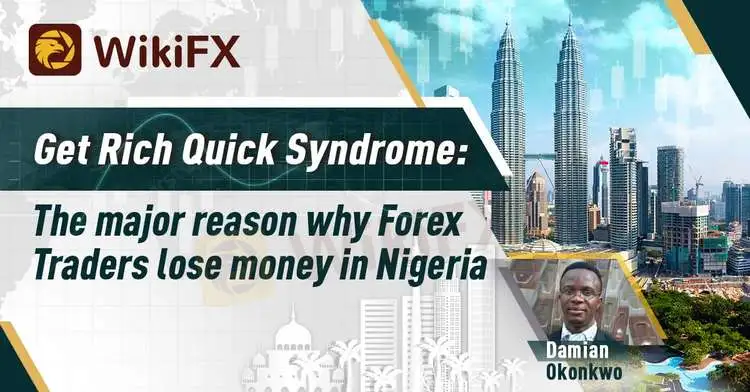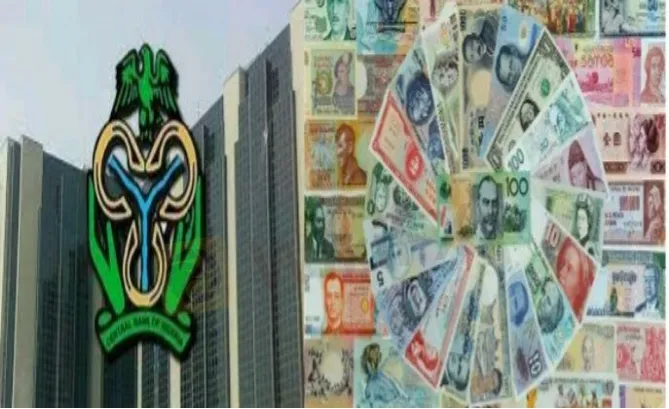简体中文
繁體中文
English
Pусский
日本語
ภาษาไทย
Tiếng Việt
Bahasa Indonesia
Español
हिन्दी
Filippiiniläinen
Français
Deutsch
Português
Türkçe
한국어
العربية
Get Rich Quick Syndrome: The major reason why Forex Traders lose money in Nigeria
Abstract:Nigeria ranks the third country with the greatest number of high-risk Forex Traders. This owes to the "Get Rich Quick Syndrome" that have dominated the minds of the average Nigerian trader. Most forex traders in Nigeria no longer consider forex trading as an investment package but rather an opportunity to double their capital on a daily and weekly basis. This has often resulted in so many loosing money daily in the Forex market.

By: Damian Okonkwo
The idea of people trading the Forex market as an investment package seems to have faded in the Nigerian ambiance. Many young Nigerians dabble into the Forex Market as an avenue to double their capital on a daily and weekly basis without first seeking to understand the market, its structures, and the fundamental factors that moves it. Forex seems to have replaced gambling with this set of traders in Nigeria. This has been tagged get rich quick syndrome leading to excessive loose on a regular basis.
Thoroughly imbued with this wrong mentality, many traders are compelled to take so much risk while trading the Forex Market. Some are pushed to use a very large lot size for entering a position. Others prefer to take multiple trades at once without any recourse to risk management. The aftermath of these dealings is that most lose money daily to the Forex market especially when the market moves a little pip against their predictions.

Major causes of the “get rich quick mentality” among Nigerian Forex Traders
Research has shown that some key factors have contributed to the excessive demand for quick profits from the forex market among Nigerian traders. Some of these reasons are seen below:
« Unemployment: The high unemployment rate in the country has led to many Nigerians taking so much risk than they could afford to bear. Most people who turn to forex trading today in Nigeria are jobless and see it as their full-time job. Hence they often expected high returns from the market-leading them to take so many risks.
« Poverty: Nigeria ranks the third poorest country in the world today despite the rich resources available in the country. Many poor people who dabble into forex see it as an opportunity to wipe out poverty from their generations which leads them to take so much risk.
« Debts/Loans unrepaid: Just as the Nigerian government has been known for borrowing more than the country could repay in centuries to come, the average Nigerian citizen is not left out in this borrowing too. Some have borrowed money to begin their trading journey while others have so many loans obtained yet to be repaid. This leads them to take so much risk while trading.
« High Economic Standard with low income: Generally there is a very high standard of living in Nigeria with little salary paid to citizens. This often leads the youth to dabble in gambling and others get rich quick business online. Of course, the result is that they keep losing money daily to the forex market.
« Greediness: Some Nigerian traders are not comfortable with the little profits they make from the forex market. They just want to make the highest profit possible every day. This has led many to take excessive risks while trading.

Disclaimer:
The views in this article only represent the author's personal views, and do not constitute investment advice on this platform. This platform does not guarantee the accuracy, completeness and timeliness of the information in the article, and will not be liable for any loss caused by the use of or reliance on the information in the article.
Read more

Doo Financial Expands Regulatory Reach with Offshore Licenses in BVI and Cayman Islands
According to the report, Doo Group, a prominent Singapore-based online brokerage firm, has strengthened its global presence by securing new offshore licenses for its brokerage brand, Doo Financial. The company recently announced that entities under the Doo Financial umbrella have been granted licenses by two key offshore regulatory bodies: the British Virgin Islands Financial Services Commission (BVI FSC) and the Cayman Islands Monetary Authority (CIMA).

The Hidden Checklist: Five Unconventional Steps to Vet Your Broker
Forex broker scams continue to evolve, employing new tactics to appear credible and mislead unsuspecting traders. Identifying these fraudulent schemes requires vigilance and strategies beyond the usual advice. Here are five effective methods to help traders assess the legitimacy of a forex broker and avoid potential pitfalls.

Doo Financial Obtains Licenses in BVI and Cayman Islands
Doo Financial, a subsidiary of Singapore-based Doo Group, has expanded its regulatory footprint by securing new offshore licenses from the British Virgin Islands Financial Services Commission (BVI FSC) and the Cayman Islands Monetary Authority (CIMA).

CFI’s New Initiative Aims to Promote Transparency in Trading
A new programme has been launched by CFI to address the growing need for transparency and awareness in online trading. Named “Trading Transparency+: Empowering Awareness and Clarity in Trading,” the initiative seeks to combat misinformation and equip individuals with resources to evaluate whether trading aligns with their financial goals and circumstances.
WikiFX Broker
Latest News
AIMS Broker Review
The Hidden Checklist: Five Unconventional Steps to Vet Your Broker
Russia to Fully Ban Crypto Mining in 10 Regions Starting January 1, 2025
YAMARKETS' Jingle Bells Christmas Offer!
Why is there so much exposure against PrimeX Capital?
Doo Financial Expands Regulatory Reach with Offshore Licenses in BVI and Cayman Islands
MTrading’s 2025 "Welcome Bonus" is Here
Doo Financial Obtains Licenses in BVI and Cayman Islands
CFI’s New Initiative Aims to Promote Transparency in Trading
Currency Calculator


